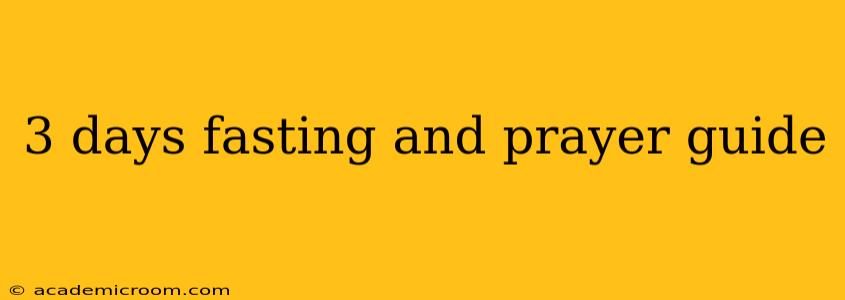Fasting and prayer, a practice observed across numerous faiths, offers a powerful opportunity for spiritual growth, reflection, and connection with the divine. This guide provides a comprehensive approach to undertaking a three-day fast, focusing on preparation, execution, and post-fast recovery. Remember, always consult your doctor before starting any fasting regimen, especially if you have underlying health conditions.
What is a 3-Day Fast?
A 3-day fast involves abstaining from food for 72 hours, focusing intently on prayer, meditation, and spiritual reflection. The specific type of fast—water only, juice fast, or other variations—should be determined based on individual needs and capabilities. It's crucial to prioritize safety and well-being throughout the process. This isn't about deprivation; it's about intentional spiritual discipline.
Preparing for Your 3-Day Fast
Proper preparation is crucial for a successful and safe fast. This isn't about suddenly depriving your body; it's about a gradual transition.
1. Consult Your Doctor:
This is paramount. Individuals with certain medical conditions, such as diabetes, heart problems, or eating disorders, should seek medical advice before undertaking any fast.
2. Gradual Reduction of Food Intake:
In the days leading up to your fast, gradually reduce your food intake. This helps your body adjust and minimizes the risk of severe hunger pangs or other side effects. Don't drastically cut calories; simply eat lighter meals.
3. Choose Your Fasting Type:
Decide on the type of fast you'll undertake. A water-only fast is the most common, involving only water consumption. Some opt for juice fasts, using diluted fruit or vegetable juices, but be mindful of sugar content. Always prioritize safety and choose what feels best for your body.
4. Plan Your Schedule:
Structure your days to include dedicated prayer times, meditation sessions, and periods of rest. Avoid strenuous physical activity. Consider having a designated quiet space for reflection.
During Your 3-Day Fast
The three days are about spiritual focus. While physical discomfort is possible, focus on the spiritual journey.
1. Hydration is Key:
Drink plenty of water throughout the day. Dehydration can exacerbate negative effects.
2. Prayer and Meditation:
Dedicate ample time to prayer and meditation. Use this time to connect with your faith, reflect on your life, and seek spiritual guidance.
3. Rest and Relaxation:
Get enough rest. Avoid strenuous activity. Your body needs time to adjust.
4. Address Discomfort:
Expect some hunger pangs, headaches, or fatigue. Address these through rest, prayer, and staying hydrated. If symptoms are severe, break your fast and consult a doctor.
5. Journaling:
Record your thoughts, feelings, and spiritual experiences during the fast. This can provide valuable insights into your personal growth.
Breaking Your Fast
Reintroducing food is just as important as the fast itself. A gradual approach prevents digestive distress.
1. Start with Light Foods:
Begin with easily digestible foods such as broths, soups, or fruits. Avoid heavy, greasy, or processed foods.
2. Gradual Increase in Food Intake:
Over the following days, gradually increase your food intake. Listen to your body and eat when you’re hungry.
3. Maintain a Healthy Diet:
After your fast, focus on maintaining a healthy and balanced diet.
People Also Ask (PAA) Questions and Answers
H2: What are the benefits of fasting and prayer?
Fasting and prayer offers many benefits, including increased spiritual awareness, deepened faith, improved self-discipline, and a renewed focus on personal values. Many report feelings of enhanced clarity, compassion, and empathy.
H2: Is a 3-day fast dangerous?
For healthy individuals, a 3-day fast is generally safe, but it's crucial to consult a physician beforehand, especially if you have underlying health conditions. Listen to your body and don't hesitate to stop if you experience severe discomfort.
H2: How do I overcome hunger pangs during a fast?
Drink plenty of water, engage in prayer or meditation, and rest. Distraction can also help. Remember the spiritual purpose of your fast; focus on that.
H2: What if I feel weak or dizzy during the fast?
If you experience significant weakness or dizziness, stop the fast and consult a doctor immediately. These could be signs of dehydration or other problems.
H2: Can I fast if I'm on medication?
Consult your doctor before fasting if you are taking medication. Some medications may interact negatively with fasting.
This guide provides a framework; adapt it to suit your individual needs and circumstances. Remember that the journey of fasting and prayer is a personal one. Approach it with intentionality, mindfulness, and a focus on your spiritual growth.
